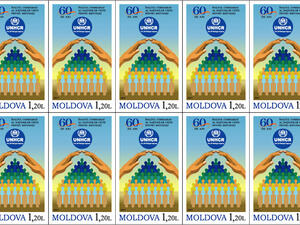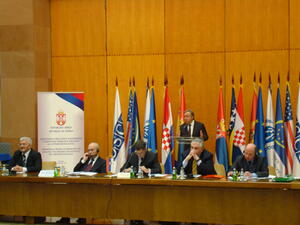UN refugee agency marks its 60th anniversary with appeal for renewed international commitment to helping the world's forcibly displaced
UN refugee agency marks its 60th anniversary with appeal for renewed international commitment to helping the world's forcibly displaced
The head of the UN refugee agency, António Guterres, marked today's 60th anniversary of the organization he heads by appealing for strengthened global impetus in tackling the world's new and fast-evolving displacement and statelessness problems.
Speaking at the agency's headquarters in Geneva, Guterres warned of multiple new factors that are causing displacement. He said many of these did not exist at the time of UNHCR's founding or when the major international refugee and statelessness conventions were created.
"UNHCR traditionally was supporting refugees, people that would cross a border because of a conflict or persecution," he said. "But now we see that more and more people are crossing borders because of extreme poverty, because of the impact of climate change, [and] because of their interrelation with conflict. So there are new patterns of forced displacement and the international community needs to be able to tackle those challenges."
UNHCR was created on 14th December 1950 by the UN General Assembly. Its original purpose was to address the post-World War II refugee situation in Europe, but its work quickly expanded. By 1956 it was facing its first major international emergency with the outpouring of refugees when Soviet forces crushed the Hungarian Revolution.
In the 1960s, the decolonization of Africa produced the first of that continent's numerous refugee crises needing UNHCR intervention. Over the following two decades, UNHCR had to help with displacement crises in Asia and Latin America. Today it deals with major displacement situations around the world. The global population of refugees, internally displaced people, and asylum seekers stands at 43 million people - most of them under UNHCR's duty of care.
Guterres pointed to major displacement from Somalia and Afghanistan, as examples of 21st century refugee problems that extend across multiple borders and require new and globalized approaches to finding solutions. He also highlighted the phenomenon of statelessness as requiring particular attention.
But on UNHCR's anniversary and its achievements over 60 years - which include twice being awarded the Nobel Peace Prize - Guterres said the focus should be on coming challenges which would equal anything the agency has faced in its past.
"I think it is very important to recognize that the action of UNHCR has represented for many people life instead of death, home instead of total deprivation, health instead of a disease that can even represent the risk to die, protection against the most dramatic violations of human rights..." he said. "We have many reasons to be proud, but we also have much more reasons to be concerned with the challenges we face at the present moment, and recognizing that unfortunately the root causes of conflict and displacement are not being eliminated and the next few years will be as challenging as the past."
UNHCR's 60th anniversary year, which begins this week, coincides with several related anniversaries, including the 60th anniversary of the 1951 Convention relating to the Status of Refugees (28 July 2011), the 50th anniversary of the 1961 Convention on the Reduction of Statelessness (30th August 2011), and the 150th anniversary of the birth of Fridtjof Nansen, the first League of Nations High Commissioner for Refugees (10th October 2011).
Over the coming months UNHCR will be using these occasions to push for strengthening of the international legal framework for dealing with the world's statelessness and displaced, including through increased state accessions to the key refugee and statelessness conventions.
Further information
- The Office of the United Nations High Commissioner for Refugees was established on December 14, 1950. It became operational on January 1st 1951.
- UNHCR provides protection to refugees and other displaced people, on a non-political and humanitarian basis. We also seek permanent solutions for them.
- Globally there are 43 million forcibly displaced people, the majority under UNHCR's duty of care. (15.2 million refugees, 27.1 million internally displaced, 983,000 asylum seekers).
- Globally, and by some estimates, there are as many as 12 million stateless people. UNHCR has identified 6.6 million of these in 60 countries.
- Over the past 60 years UNHCR has saved millions of lives, by bringing donor funds and international political will to bear on the world's refugee problems on a scale unimaginable prior to our founding.
- In addition to saving lives, UNHCR has helped millions of people to rebuild lives, to return safely home or to find new homes.
- UNHCR's contributions to world peace have been recognized with Nobel Peace prizes in 1954 and 1981.







